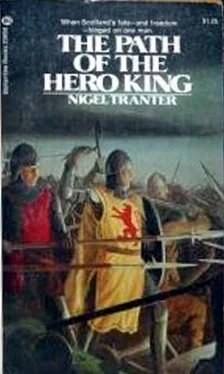The session of parliament-to which all entitled to attend, throughout the realm, of whatever faction, had been summoned -was proclaimed to occupy the two days of the 16th and 17th March, with Lent ended-a matter of some importance in the circumstances. But the previous evening had been set aside for the more dramatic and significant if less constitutionally important events. These were to be staged in the largest available premises in the city, other than the cathedral, the Guest Hall of the Augustinian Priory, one of the greatest and richest monasteries in the land. The lead of its roof had been carried off by the late King Edward for his battering machines at the siege of Stirling, and other damage done, but temporary roofing had been improvised.
To this huge hall, officially de-sanctified for the occasion by Bishop Balmyle, just returned from his consecration in Rome, the King made his way in splendid procession through the narrow crowded streets, from his quarters in one of the undamaged towers of the castle. He went on foot, beneath an elaborate purple-and-gold velvet canopy held above him on poles by four lords-Douglas, Hay, Campbell and Fleming-dressed at his most magnificent in cloth-of-gold and ruby trimmings, under the spectacular Lion Rampant tabard, a slender open gold circlet with strawberry-leaf points around his otherwise bare head. He was preceded by the cathedral choir of singing boys chanting sweet music; then by a covey of the fairest daughters of the nobility, dressed all in white and carrying garlands; and followed by no fewer than five bishops Moray Dunkeld, Brechin, Ross and Dunblane -and a great company of mitred abbots, priors, deans and the like, all in their most splendid vestments. Then came an almost more colourful cohort of Highland chiefs, chieftains and captains of clans, led by the Lord of the Isles, all in fullest Highland panoply, including Christina of Garmoran actually wearing a helmet and chain mail for the occasion. An illustrious and unnumbered array of lords and knights, lairds and sheriffs and other notables, with their ladies, composed the central body of the procession; and the provost of the royal burgh, with the magistrates, brought up the rear, another contingent of choristers finishing things off. Happily the threatening rain forbore, although there was a frolicsome wind off the sea. More than 500 people took part in that procession-and all had to be got into the Priory Guest Hall, with sufficient space left centrally for what was to follow.
It took time for busy ushers, like clerical sheep-dogs, to marshal and arrange everybody approximately in position, while musicians played from the gallery and the King sat patiently on a throne-episcopal, but better than none-on the Priors dais at the far end of the huge apartment, backed by his lords temporal and spiritual and a selection of the ladies. At length, at a sign from the door, trumpeters sounded a rousing fanfare, and Bruce rose to his feet.
My lords and ladies, my friends, my people, he said, into the hush,
I greet you well, this fair and happy day, each and all. We have
waited long for it, and many have died that it might dawn for us who
remain-God rest and reward eternally all such. Few heredo not mourn
for some of these. As I do for three brothers, and friends beyond all counting. His strong voice quivered noticeably-and that was no play-acting.
With all my heart I mourn them. But likewise from my heart thank you all who have fought and survived to see this day.
There was a strange sound from the great company, that started as a mere murmur, swelled to a rumble, rose suddenly to a mighty shout of acclaim, and so continued until the Kings hand rose to quell it.
So I, and you, rejoice as well as mourn, and thank Almighty God, he went on, voice under control again.
But, though much has been attained, and we assemble here again in council and rule, as has not been in this realm for a dozen years, yet much is yet to be done. The invader still defiles parts of my realm and our land, lurks in many strong castles, and beyond our borders still turns malevolent eyes upon this kingdom. Today, my friends, is but a pause in the struggle.
The reaction now was a low muttering roar, like distant thunder.
But at least we can now face our enemy squarely, eyes forward, like our swords. Not for ever glancing back over our shoulders.
Hear you-I say enemy, not enemies! For that is the greatest joy and comfort of this day. Our enemy is now plain to discern. It is the English invader only, and no longer those of our own kin and people who were led astray, by error, offence or fear. That is past and done with. Today. my friends, the King of Scots is king of all Scots again-as has not been since the good Alexander died at Kinghom cliff twenty-three years ago. That was something of an exaggeration, but perhaps permissible.
In token whereof I now call upon the Lord High Steward of this my realm to carry out his duty and service.
There was a ripple of exclamation at this, for James Stewart, the Hereditary High Steward, had of recent years been lying notably low on his island of Bute in the Clyde estuary. He had, of course, been one of the leaders of revolt against the old Edward once, but, an elderly man and no warrior ever, had sickened of war and come to terms with the English. He had used Bruces stabbing of the Red Comyn at Dumfries as excuse to disassociate himself-as had many another-and had not attended the coronation at Scone although he had sent his surviving son Walter. His last service to the King had been surreptitious, provision of the secret vessel which had taken the fleeing Bruce from the Clyde to Dunaverty and the Hebridean interlude. The son of his brother John, who had fallen bravely at Falkirk fight, Sir Alexander of Bonkyl, had openly taken the English part thereafter, and in fact had been captured with Thomas Randolph, and since held prisoner.
A single blast of a trumpet cut short the murmuring, and a side door of the hall opened to admit two men, one old and one young.
James, the fifth High Steward of Scotland, a tall, gaunt and gloomy man, dressed as usual all in black, but richly, had aged greatly of late. Always shambling and gangling of gait, he now moved fori ward stiffly, awkwardly, but with some dignity too, nothing hangdog about him. Nor was there any sign of guilt about his son Walter, a good-looking youth, arrayed in most handsome style and carrying himself proudly. If the concourse was looking for any kind of dramatic public humiliation, these two did not offer it.
The Stewarts advanced a few paces, bowed low to the throne and then turned to look back.
I, as Steward of His Graces realm, summon William, Earl of Ross, and his household, to pay fealty to his liege lord, Robert, Kin of Scots, the old man called. He was not a good speaker for his tongue was too big for his mouth and he dribbled continuously. But the name he slobberingly enunciated was clear enough.
Now the comment in the thronged hall was not to be damped down.
Everywhere men and women turned to stare, agog.
They had something to stare at. The man who led in the group of half a dozen was eye-catching by any standards. Of middle years, huge, ponderous, fierce-eyed and heavy-jowled, clad in a curious mixture of Highland and Lowland garb, decked with flashing jewellery, William son of William son of Farquhar MacanTagart, Earl of Ross, chief of his clan and hereditary Abbot of Applecross, stalked heavily forward, a target for all eyes-and for vituperation also, for all knew well the part he had played in handing over the Queen and the royal ladies, and in the death of the Earl of Atholl.
Ross paced on towards the dais, looking neither left nor right.
Behind him came his two sons, Sir Hugh and Sir John, the former looking embarrassed, the latter scowling. Then three young women, the Ladies Isabella and Jean Ross, the former notably beautiful, and Sir Johns wife, the Lady Margaret Comyn, daughter of the Earl of Buchan. The King was insisting on women being very much to the fore this day; and since Buchan had no son, the presence of this heiress daughter was important.
Читать дальше












